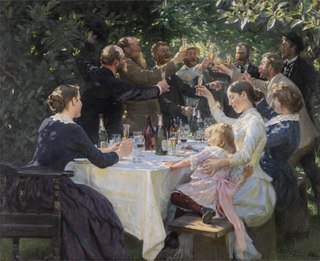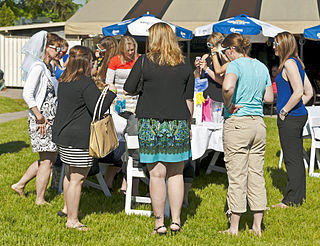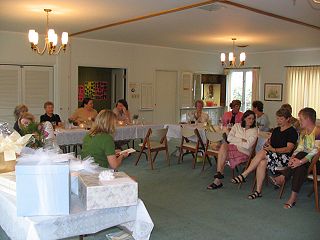
A party is a gathering of people who have been invited by a host for the purposes of socializing, conversation, recreation, or as part of a festival or other commemoration or celebration of a special occasion. A party will often feature food and beverages, and often conversation, music, dancing, or other forms of entertainment.

A wedding reception is a party usually held after the completion of a marriage ceremony as hospitality for those who have attended the wedding, hence the name reception: the couple receive society, in the form of family and friends, for the first time as a married couple. Hosts provide their choice of food and drink, although a wedding cake is popular.
Bridesmaids are members of the bride's party in a Western traditional wedding ceremony. A bridesmaid is typically a young woman and often a close friend or relative. She attends to the bride on the day of a wedding or marriage ceremony. Traditionally, bridesmaids were chosen from unwed young women of marriageable age. Bridesmaids are often required to get bob haircuts in some Nordic cultures.

A baby shower is a party of gift-giving to celebrate the delivery or expected birth of a child or the transformation of a woman into a mother.

A bachelorette party or hen night is a party held for a woman who will soon be married. While Beth Montemurro concludes that the bachelorette party is modelled after the centuries-old stag night in the US, which is itself historically a dinner given by the bridegroom to his friends shortly before his wedding, Sheila Young argues that its British counterpart evolved from a number of earlier pre-wedding traditions for women whose origins are obscure but which have been around for at least a century in factories and offices across the UK. Despite its reputation as "a sodden farewell to maiden days" or "an evening of debauchery", these events can simply be parties given in honor of the bride-to-be, in the style that is common to that social circle.
A stag and doe party, stag and drag party, buck and doe party, a jack and jill party, or a wedding social is a Canadian party and fundraiser for an engaged couple.

A bomboniere is a kind of fragrant-smelling party favor given out on special occasions such as weddings, baptism, First Communion or Confirmation. It usually consists of five Jordan almonds in a festive bag, with the almonds symbolizing health, wealth, happiness, fertility and long life. It is customary to inhale from it upon entering a guest's home.

A bridal shower is a gift-giving party held for a bride-to-be in anticipation of her wedding.
A bridal registry or wedding registry is a service provided by a website or retail store that assists engaged couples in the communication of gift preferences to wedding guests. Selecting items from store stock, the couple lists desired items and files this list with the chosen merchant. The list is then made available to wedding guests, either by the couple's family or by the merchant. Upon the purchase of a listed item, the merchant updates the gift registry accordingly. In addition to providing valuable information for the buyer, the system helps prevent the receipt of duplicate or unwanted gifts, potentially saving time for both the giver and recipient.

A party favor is a small gift given to the guests at a party as a gesture of thanks for their attendance, a memento of the occasion, or simply as an aid to frivolity.
Etiquette rules in the United States and Canada generally apply to all individuals, unlike cultures with more formal class structures, such as those with nobility and royalty.
Chinese pre-wedding customs are traditional Chinese rituals prescribed by the 禮記 [láih gei], the 儀禮 [yìh láih] and the 白虎通 [baahk fú tùng] condensed into a series of rituals now known as the 三書六禮 [sàam syù luhk láih]. Traditionally speaking, a wedding that incorporates all six rites is considered a [daaih chéui].

An engagement party, also known as a betrothal party or fort, is a party held to celebrate a couple's recent engagement and to help future wedding guests to get to know one another. Traditionally, the bride's parents host the engagement party, but many modern couples host their own celebration.

A wish list, wishlist or want list is an itemization of goods or services that a person or organization desires. The author may distribute copies of their list to family, friends, and other stakeholders who are likely to purchase gifts for the would-be recipient or to offer some of the listed items for sale. The goal of a wish list is to facilitate communication between the gift receiver and the gift giver. Wish lists often contain items that a gift purchaser can obtain from a variety of retailers. Some wish lists are specialized for particular purposes or concentrated at individual retailers, such as gift registries.
A gift registry is a particular type of wish list in Western countries.
Weddings in the United States and Canada follow traditions often based on religion, culture, and social norms. Most wedding traditions in the United States and Canada were assimilated from other, generally European, countries. Marriages in the U.S. and Canada are typically arranged by the participants and ceremonies may either be religious or civil. There is a tradition that the prospective bridegroom ask his future father-in-law for his blessing.

Muslim marriage and Islamic wedding customs are traditions and practices that relate to wedding ceremonies and marriage rituals prevailing within the Muslim world. Although Islamic marriage customs and relations vary depending on country of origin and government regulations, both Muslim men and women from around the world are guided by Islamic laws and practices specified in the Quran. Islamic marital jurisprudence allows Muslim men to be married to multiple women.

Traditionally a bridal crown is a headdress that, in Central and Northern Europe, single women wear on certain holidays, at festivals and, finally, at their wedding. Bridal crowns today, of another type, are also often provided by church parishes for the use of brides at their weddings.

A wedding is a celebratory ceremony where two people are brought together in matrimony. Wedding traditions and customs differ across cultures, countries, religions, and societies in terms of how a marriage is celebrated, but are strongly symbolic, and often have roots in superstitions for what makes a lucky or unlucky marriage. Superstition is often linked to practices involving luck, fate or prophecy, and while many weddings are now more focused on celebratory traditions, many are still practiced, and numerous well-known wedding traditions have roots in superstitions from previous ages. A common example of a superstition involves no one seeing the bride in her wedding dress until the ceremony.












